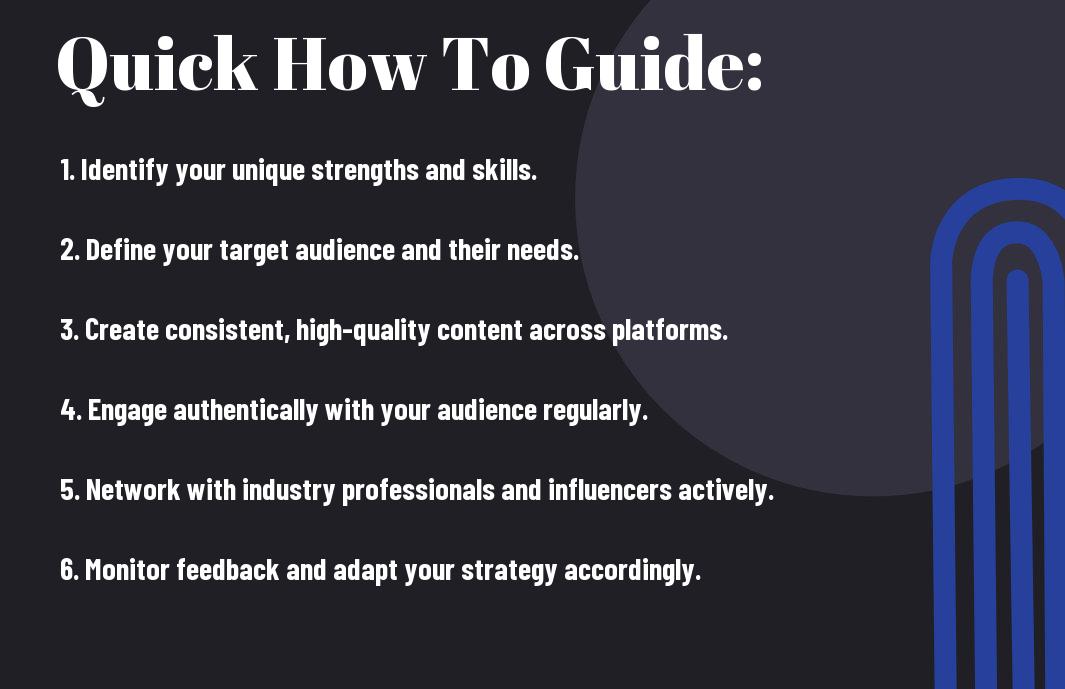
There’s a growing need for individuals to differentiate themselves in today’s competitive market. Your personal brand is your unique identity, and it plays a vital role in how others perceive you and your professional value. This guide will provide you with actionable steps to develop a compelling personal brand that reflects your strengths, resonates with your target audience, and stands out from the competition. By strategically crafting your image and message, you can create a powerful presence that attracts opportunities and fosters lasting professional relationships.

Understanding Personal Branding
The concept of personal branding revolves around how you present yourself to the world. It is about creating a unique identity that distinguishes you from others in your field. In a competitive market, your personal brand serves as a powerful tool to communicate your value, establish credibility, and build meaningful connections with your audience.
Defining Personal Branding
On a fundamental level, personal branding is the process of developing and managing your reputation and visibility in your niche. It involves showcasing your skills, experiences, and personality in a way that resonates with your target audience, helping you to stand out and attract opportunities. You are imperatively telling your story and making it compelling.
Importance in a Competitive Market
Branding yourself effectively allows you to carve out a distinct space in a crowded marketplace. When you strengthen your personal brand, you enhance your ability to influence, motivate, and engage others, setting yourself apart from competitors.
Another key advantage of a robust personal brand is its potential to build trust with your audience. In a market saturated with options, people tend to gravitate towards brands or individuals they trust. By consistently sharing your expertise and values, you create a reliable persona that encourages others to engage with your work, ultimately leading to more opportunities and partnerships.
Key Factors for Building Your Brand
Even in today’s competitive environment, establishing a strong personal brand requires clarity and strategy. Start by focusing on key factors that distinguish you from others:
- Define your unique value proposition
- Identify your target audience
- Create consistent messaging across platforms
- Leverage social media for visibility
- Build authentic connections within your industry
Thou must ensure that each aspect of your brand aligns with your core values and goals.
Unique Value Proposition
There’s no better way to stand out than by clearly defining your unique value proposition (UVP). This entails articulating what makes you different and how you can solve problems for your audience. When you establish a compelling UVP, you create a memorable impression that keeps your brand top-of-mind.
Target Audience Identification
Any successful brand-building strategy hinges on identifying your target audience effectively. Knowing who your ideal audience is allows you to tailor your messaging and content to resonate with them directly.
Proposition out your brand can significantly improve your chances of success if you truly understand your target audience’s needs, preferences, and behaviors. Conducting thorough market research, engaging in conversations, and analyzing your competition will help you sculpt an accurate profile of those you aim to reach. This enables you to position your brand more effectively and foster a deeper connection with your audience.
How to Enhance Your Online Presence
Despite the saturation of content on the internet, enhancing your online presence is crucial to distinguish your brand from the competition. This requires a strategic approach to leveraging digital platforms where you can showcase your expertise and engage with your audience. By creating coherent, valuable, and authentic content, you can leave a lasting impression and foster connections in your industry.
Social Media Strategies
You should actively engage on social media platforms, sharing insightful posts, responding to comments, and participating in relevant discussions. Focus on creating shareable content that aligns with your brand’s message, and utilize analytics tools to track engagement, allowing you to refine your strategy over time. Building a loyal following requires consistency and authenticity in your online interactions.
Optimizing Your Personal Website
Social media is only one part of your online presence; having a well-optimized personal website is equally important. Your website serves as a central hub where potential clients, employers, or collaborators can learn more about you and your work.
To maximize the effectiveness of your personal website, ensure it reflects your brand identity through design and content. Prioritize user experience by making navigation simple and including clear calls-to-action. Craft compelling copy that highlights your skills, achievements, and values, and optimize your site for search engines to increase visibility. Regularly update your blog or portfolio sections to showcase your ongoing projects and insights, keeping your content fresh and engaging.
Crafting Your Brand Message
Not having a clear brand message can hinder your ability to stand out in a competitive market. To capture your audience’s attention, focus on expressing your unique value proposition and what you stand for. This message should be succinct, memorable, and aligned with your brand identity, forging a more profound connection with your audience. Establishing a consistent brand message will ensure that your audience can easily understand and relate to you, ultimately fostering brand loyalty and trust.
Storytelling Techniques
Storytelling is an effective way to convey your brand message authentically. By sharing personal anecdotes or experiences, you can create an emotional connection with your audience. This approach helps to humanize your brand and makes it relatable, allowing your audience to engage with your message on a deeper level. Incorporating relatable characters, challenges faced, and the solutions you found can make your brand’s story more compelling. Aim to weave your core values and mission into these narratives to align your audience with your brand’s vision.
Consistency in Communication
Communication consistency is imperative for solidifying your brand image. When your messaging aligns across various platforms and channels, you reinforce your brand identity, making it easier for your audience to understand and recognize you. Whether you’re posting on social media, writing blog posts, or engaging in business communication, maintaining a uniform tone, style, and message fosters trust. The more consistent you are, the more reliable you appear, allowing your audience to build confidence in your brand.
Crafting a consistent communication strategy involves establishing clear guidelines for your messaging. Define your brand voice and tone, so every piece of content reflects your unique identity. Utilize templates or checklists to ensure uniformity across all platforms, whether visual or textual. Regularly auditing your existing content can help you identify any inconsistencies, ensuring that each interaction reinforces your brand narrative and strengthens audience loyalty. A cohesive approach not only enhances recognition but also invites deeper engagement from your audience.
Tips for Networking and Relationship Building
After identifying your goals, focus on expanding your network. Build relationships through shared interests and mutual benefits by following these tips:
- Attend industry events and workshops.
- Utilize social media platforms effectively.
- Engage in meaningful conversations, both online and offline.
- Follow up with personal notes or messages.
The stronger your connections, the more opportunities you will create for your personal brand.
Leveraging Professional Networks
Little efforts can go a long way in maximizing the benefits of your professional networks. Cultivate genuine relationships by participating in discussions, collaborating on projects, and sharing valuable resources. Engage with peers by offering support and insights—this not only strengthens your connections but also showcases your expertise.
Engaging with Influencers
For best results, actively seek to engage with influencers in your field. Start by following their content, sharing their insights, and adding thoughtful comments to their posts. This gradual approach helps to build rapport and demonstrates your genuine interest in their work.
With a strategic approach, you can create meaningful connections with influencers that elevate your personal brand. Consider reaching out directly with personalized messages that highlight shared interests or mutual connections. Host webinars or collaborate on content to showcase your expertise alongside theirs. This not only increases your visibility but also establishes credibility within your industry, paving the way for greater opportunities.
Measuring and Adapting Your Brand
All successful personal brands require continuous measurement and adaptation. To ensure your brand remains relevant and impactful, regularly evaluate its performance and make necessary adjustments. This involves monitoring engagement metrics, assessing audience feedback, and refining your messaging to align with your evolving goals. By being proactive in this process, you can maintain a strong presence in a competitive market.
Feedback and Self-Assessment
On your journey to building a strong personal brand, actively seek feedback from your audience and conduct self-assessments. Use surveys, social media interactions, and personal reflections to gauge how your brand is perceived. By understanding your strengths and areas for improvement, you can make informed decisions that drive growth and enhance your identity.
Adapting to Market Changes
Changes in the market can impact your personal brand significantly. Staying attuned to industry trends, shifts in audience preferences, and new technologies is necessary for your ongoing success. Adapting your brand strategy accordingly ensures you remain relevant and continue to meet the needs of your target audience.
For instance, if you notice a growing trend toward sustainability, consider incorporating eco-friendly practices into your brand or highlighting your commitment to social responsibility. Monitoring competitor strategies can also provide insights that help you refine your positioning. Regularly assess how your audience’s needs are changing and pivot when necessary to ensure your brand remains appealing and valuable.
To wrap up
So, to build a strong personal brand in a competitive market, you must define your unique value proposition, establish your online presence, and consistently engage with your audience. Focus on delivering high-quality content that showcases your expertise and embodies your values. Networking with industry professionals and maintaining a genuine approach will further enhance your credibility. Finally, be adaptable and open to feedback, as this will help you refine your brand over time. By taking these steps, you can effectively differentiate yourself and leave a lasting impression in your field.
Leave a Reply